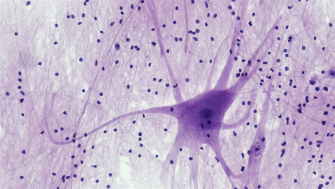How does Alecensa (alectinib) work for ALK+ NSCLC?
Last updated: 01 November 2019

You can legally access new medicines, even if they are not approved in your country.
Learn how
Alecensa (alectinib) was approved by the Food and Drug Administration (FDA) in 2015 and the European Medicines Agency (EMA) in 2017. Alecensa (alectinib) treats a specific type of cancer: non-small cell lung cancer (NSCLC) with anaplastic lymphoma kinase positive (or ALK+) gene.
But what does that actually mean? Here’s an easy-to-understand guide on how Alecensa (alectinib) works.
What is NSCLC?
Lung cancer is caused by cells in the lungs that grow abnormally. These cells can develop tumours that spread to other parts of the body. Roughly 80 - 85% of lung cancers are non-small cell lung cancers (NSCLC). NSCLC includes pretty much any type of lung cancer that isn’t small cell lung cancer.
Within the category of NSCLC, there are a few different sub-types, such as adenocarcinoma, squamous cell carcinoma, large cell undifferentiated carcinoma (amongst others).
What does it mean if you have ALK+ NSCLC?
Patients who are anaplastic lymphoma kinase positive (ALK+) have a gene that other people do not have.
This gene, ALK, is thought to play an important role in how NSCLC behaves, which is why new treatments have been developed that specifically target this gene and slow it down. These medicines are called ALK-inhibitors.
What are the most common treatments for NSCLC?
Platinum-based chemotherapy (chemo) has been the most common first-line treatment for NSCLC. But for people who have ALK+ NSCLC, treatments such as ALK inhibitors are also used.
Alecensa as an ALK+ inhibitor
One of the ALK-inhibitors used in the treatment of ALK+ NSCLC is Alecensa (alectinib). Alecensa (alectinib) is for patients who have the ALK+ gene, and for whom the NSCLC has spread to other parts of their body. To know whether a patient has the ALK+ gene, a doctor will do a genetic test.
Alecensa (alectinib) as a treatment after crizotinib
In some studies, Alecensa (alectinib) was also shown to be effective for patients with ALK+ NSCLC, who have already been treated with crizotinib. Crizotinib is also an ALK+ inhibitor.
In two studies, Alecensa (alectinib) shrunk the size of tumours that had grown to other parts of the body, particularly those that had spread to the brain and nervous system.
Alecensa (alectinib) may therefore play an important role in the treatment of ALK+ NSCLC.
Alecensa (alectinib) is approved and available in a number of countries. If this medicine is not available in your country, we may be able to help. Please contact everyone.org for further information. Please note, patients purchasing a medicine through everyone.org always need a prescription from their treating doctor.
Sources:
1. Highlights of Prescribing Information: Alecensa (alectinib), Genentech, Inc., A Member of the Roche Group, October 2017 https://www.accessdata.fda.gov/drugsatfda_docs/label/2017/208434s003lbl.pdf
2. European Medicines Agency. Alecensa: Authorisation Details. (Last updated: 04/04/2018). Cited 19/06/2018. http://www.ema.europa.eu/ema/index.jsp?curl=pages/medicines/human/medicines/004164/human_med_002068.jsp&mid=wc0b01ac058001d124
3. Cancer.org. What is Non-Small Cell Lung Cancer? (Last reviewed: 8/02/2016). Cited 18/06/2018. https://www.cancer.org/cancer/non-small-cell-lung-cancer/about/what-is-non-small-cell-lung-cancer.html.
4. Alecensa.com.Cited 18/06/2018. https://www.alecensa.com/patient.html.
5. Fan JS, et al. The efficacy and safety of alectinib in the treatment of ALK+ NSCLC: a systematic review and meta-analysis. Dove Medical Press. Published 6/11/2017. https://www.dovepress.com/the-efficacy-and-safety-of-alectinib-in-the-treatment-of-alk-nsclc-a-s-peer-reviewed-fulltext-article-OTT
6. Cancer Research UK: Crizotinib (Xalkori). (Last reviewed 16/04/2018). Cited 18/06/2018 http://www.cancerresearchuk.org/about-cancer/cancer-in-general/treatment/cancer-drugs/drugs/crizotinib




